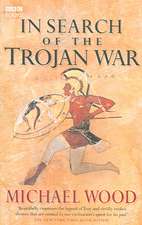The European Dynastic States 1494-1660: Short Oxford History of the Modern World
Richard Bonneyen Limba Engleză Paperback – 21 noi 1991
Preț: 387.25 lei
Preț vechi: 468.53 lei
-17% Nou
Puncte Express: 581
Preț estimativ în valută:
74.12€ • 77.08$ • 62.02£
74.12€ • 77.08$ • 62.02£
Carte tipărită la comandă
Livrare economică 04-10 martie
Preluare comenzi: 021 569.72.76
Specificații
ISBN-13: 9780198730231
ISBN-10: 0198730233
Pagini: 694
Ilustrații: 10 maps, 8 tables
Dimensiuni: 157 x 231 x 32 mm
Greutate: 1.05 kg
Ediția:New.
Editura: OUP OXFORD
Colecția OUP Oxford
Seria Short Oxford History of the Modern World
Locul publicării:Oxford, United Kingdom
ISBN-10: 0198730233
Pagini: 694
Ilustrații: 10 maps, 8 tables
Dimensiuni: 157 x 231 x 32 mm
Greutate: 1.05 kg
Ediția:New.
Editura: OUP OXFORD
Colecția OUP Oxford
Seria Short Oxford History of the Modern World
Locul publicării:Oxford, United Kingdom
Cuprins
List of maps; List of tables; Chronology; Part I. Religious Developments in the European Dynastic States: Religious divisions in early modern Europe; Part II. The Development of the European Dynastic States: Europe in the age of the Italian wars 1494-1559; Europe in the age of the wars of religion 1559-1618; The struggle for European hegemony 1618-1660; The outsiders of Europe; Part III. The Structure of the European Dynastic States: The rise of European absolutism; Population and social structure; The European economy; Court, culture, and community; Conclusion: The European dynastic states; Maps; Notes; Guide to further reading; Index
Recenzii
`Profesor Bonney naturally draws on his massive erudition in French state-building as a paradigm or contrast to the rest of the European states; but even where he is synthesizing the work of others there is a clear, constructive authorial presence ... This book is a meticulous, highly scholarly work of reference, helped by an ample and modern bibliography ... It will be referred to often and with confidence.'Euan Cameron, History
`Very useful volume. Deals well with both themes and narrative. The chronology, maps and lists of rulers are especially useful - I dare say they will prevent the confusion that often arises when students have to flit from topic to topic with little background; it will be possible to locate individual events within reigns and historical context with much greater rapidity. Excellent.'Dr David Laven, University of Keele
'The most impressive part of the book lies in its treatment of political developments. The sheer clarity with which these are analysed is, time and again, so very striking. Even seasoned scholars stand to learn much from Professor Bonney's ability to give an almost aerial survey of one of the most confused and confusing epochs of European history. His treatment of economic and financial affairs in the final, thematic, section of the book is among the best and most useful available ... cohorts of grateful students will provide the best accolade of this book, so very useful.'Jerzy Lukowski, University of Birmingham, Renaissance Studies, Vol. 6, No. 3-4, 1992
'This very comprehensive, indeed formidable, study of the author's definition of dynastic monarchy is a scholarly work ... This text is as comprehensive as any that is available for students in this era. Narrative themes and the introduction to current debates are woven into a very broad and though-provoking study. There is a helpful guide to further reading and a very comprehensive index. This is good value for money.'Noeline Hall, Australian Journal of Politics and History, No. 3, 1992
'he writes well-organized, well-documented arguments of relentless clarity - ideal qualities in the author of any general textbook, and triumphantly exemplified here ... this is an excellent book ... Resoundingly clear, and offering a confidential lead on most matters, it has all the aids to understanding that students look for. Professor Bonney is particularly lucid ... on all matters financial.'William Doyle, University of Bristol, French History, Vol. 6, No. 4, Dec '92
'a superb annotated bibliography for each chapter ... A detailed chronology and dynastic charts are placed where they are most useful, at the beginning.'Donald P. King, Whitman College, Teaching History, Spring 1993
'Bonney makes his argument with a wealth of detail and a critical approach to many of the accepted interpretations of the "early modern" period. Bonney displays superb political narrative. As an experienced guide, Bonney leads the reader through the intricate rivalries of the ruling houses ... For readers already familiar with the basic landscape, Bonney expertly points out usually overlooked features and offers many fresh perspectives.'Robert B. Luehrs, History, Fall 1993
'a remarkably successful survey and detailed introduction to early modern political history ... The European Dynastic States is an informed and innovative addition to the historical literature on early modern Europe. Each reader will find something here with which to disagree (such is the nature of surveys), but Richard Bonney should be applauded for his useful blend of political and social history and the interpretive potential it offers.'Edmund M. Kern, Lawrence University, Sixteenth Century Journal XXV/4 (1994)
'Bonney is up to the task. He does a masterful job of imposing form on an enormous sprawl of diverse material ... essentially a reference book, a compact source of basic information about the first phase of the development of the modern nation state ... This is an excellent book. It accomplishes its purpose as a reference work without being impenetrable, it adds thought-provoking interpretation that is not whimsical, and it is up-to-date without being an instant anachronism.'William H. Cobb, East Carolina University, Journal of the Association of Historians in North Carolina, Vol. 2, Fall 1994
`Very useful volume. Deals well with both themes and narrative. The chronology, maps and lists of rulers are especially useful - I dare say they will prevent the confusion that often arises when students have to flit from topic to topic with little background; it will be possible to locate individual events within reigns and historical context with much greater rapidity. Excellent.'Dr David Laven, University of Keele
'The most impressive part of the book lies in its treatment of political developments. The sheer clarity with which these are analysed is, time and again, so very striking. Even seasoned scholars stand to learn much from Professor Bonney's ability to give an almost aerial survey of one of the most confused and confusing epochs of European history. His treatment of economic and financial affairs in the final, thematic, section of the book is among the best and most useful available ... cohorts of grateful students will provide the best accolade of this book, so very useful.'Jerzy Lukowski, University of Birmingham, Renaissance Studies, Vol. 6, No. 3-4, 1992
'This very comprehensive, indeed formidable, study of the author's definition of dynastic monarchy is a scholarly work ... This text is as comprehensive as any that is available for students in this era. Narrative themes and the introduction to current debates are woven into a very broad and though-provoking study. There is a helpful guide to further reading and a very comprehensive index. This is good value for money.'Noeline Hall, Australian Journal of Politics and History, No. 3, 1992
'he writes well-organized, well-documented arguments of relentless clarity - ideal qualities in the author of any general textbook, and triumphantly exemplified here ... this is an excellent book ... Resoundingly clear, and offering a confidential lead on most matters, it has all the aids to understanding that students look for. Professor Bonney is particularly lucid ... on all matters financial.'William Doyle, University of Bristol, French History, Vol. 6, No. 4, Dec '92
'a superb annotated bibliography for each chapter ... A detailed chronology and dynastic charts are placed where they are most useful, at the beginning.'Donald P. King, Whitman College, Teaching History, Spring 1993
'Bonney makes his argument with a wealth of detail and a critical approach to many of the accepted interpretations of the "early modern" period. Bonney displays superb political narrative. As an experienced guide, Bonney leads the reader through the intricate rivalries of the ruling houses ... For readers already familiar with the basic landscape, Bonney expertly points out usually overlooked features and offers many fresh perspectives.'Robert B. Luehrs, History, Fall 1993
'a remarkably successful survey and detailed introduction to early modern political history ... The European Dynastic States is an informed and innovative addition to the historical literature on early modern Europe. Each reader will find something here with which to disagree (such is the nature of surveys), but Richard Bonney should be applauded for his useful blend of political and social history and the interpretive potential it offers.'Edmund M. Kern, Lawrence University, Sixteenth Century Journal XXV/4 (1994)
'Bonney is up to the task. He does a masterful job of imposing form on an enormous sprawl of diverse material ... essentially a reference book, a compact source of basic information about the first phase of the development of the modern nation state ... This is an excellent book. It accomplishes its purpose as a reference work without being impenetrable, it adds thought-provoking interpretation that is not whimsical, and it is up-to-date without being an instant anachronism.'William H. Cobb, East Carolina University, Journal of the Association of Historians in North Carolina, Vol. 2, Fall 1994
Notă biografică
Bonney is the author of The King's Debts: Finance and Politics in France 1589-1661 (Clarendon Press, 1981) and Political Change in France under Richelieu and Mazarin 1624-1661 (Clarendon Press, 1978)


























